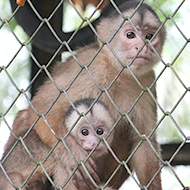
The charity has called for 'quick, meaningful action' on the Kept Animals Bill.
The RSPCA has expressed dismay after a debate on the Animal Welfare (Kept Animals) Bill failed to fix a date for its return.
Brought forward by MP Elliot Colburn, the debate took place in Westminster on Monday (5 December) in response to a petition urging the government to resume the severely delayed Bill.
RSPCA head of public affairs David Bowles said: “We are dismayed that no new date has been set for the resumption of the Kept Animals Bill. Along with the UK Government’s recent failed record on key animal welfare pledges, this is sending out an increasingly worrying signal - we want to see animal welfare legislation firmly back on track.”
First introduced to the House of Commons in June 2021, the Kept Animals Bill has not been progressed since the Committee stage in November 2021. The Bill would address key animal welfare issues, such as placing restrictions on keeping primates as pets and ending the importation of puppies with cropped ears.
Mr Bowles continued: “Enacting this legislation has no downsides: the UK Government would gain lots of “Brownie Points”, demonstrating that it is listening to the country.
“The Kept Animals Bill must be given priority so that practices such as the live exports of animals for slaughter, keeping primates as pets and the cruel puppy import trade become consigned to history as soon as possible.”
He added: “We fear that without quick, meaningful action on the Kept Animals Bill, the UK Government's policy agenda for animal welfare is on the verge of complete collapse.”
According to a recent survey, 80 per cent of UK adults support making the private keeping of primates illegal, and 76 per cent support a ban on imports of dogs with cropped ears.



 The Veterinary Medicines Directorate (VMD) is inviting applications from veterinary students to attend a one-week extramural studies (EMS) placement in July 2026.
The Veterinary Medicines Directorate (VMD) is inviting applications from veterinary students to attend a one-week extramural studies (EMS) placement in July 2026.